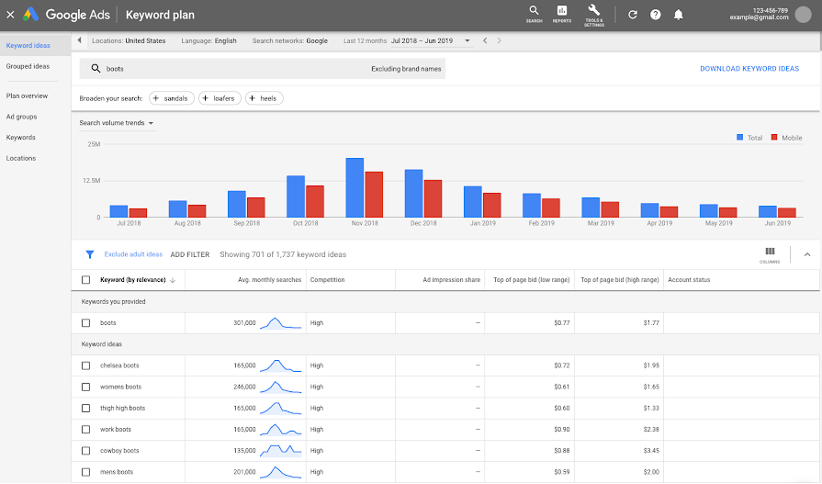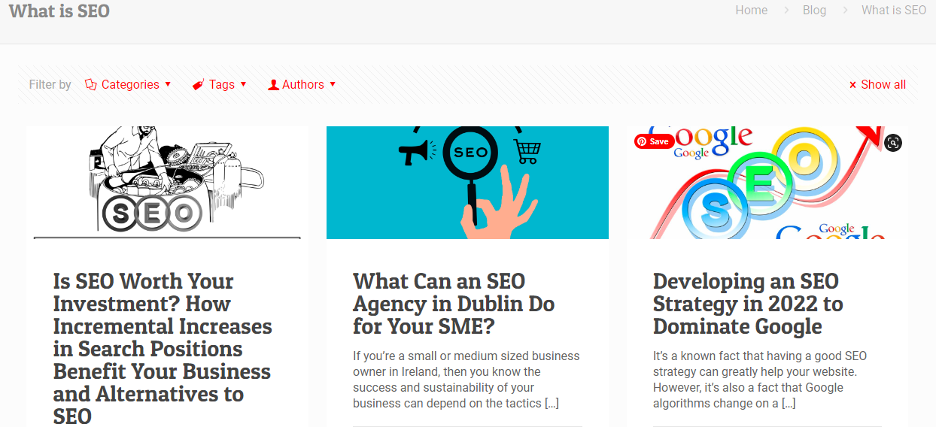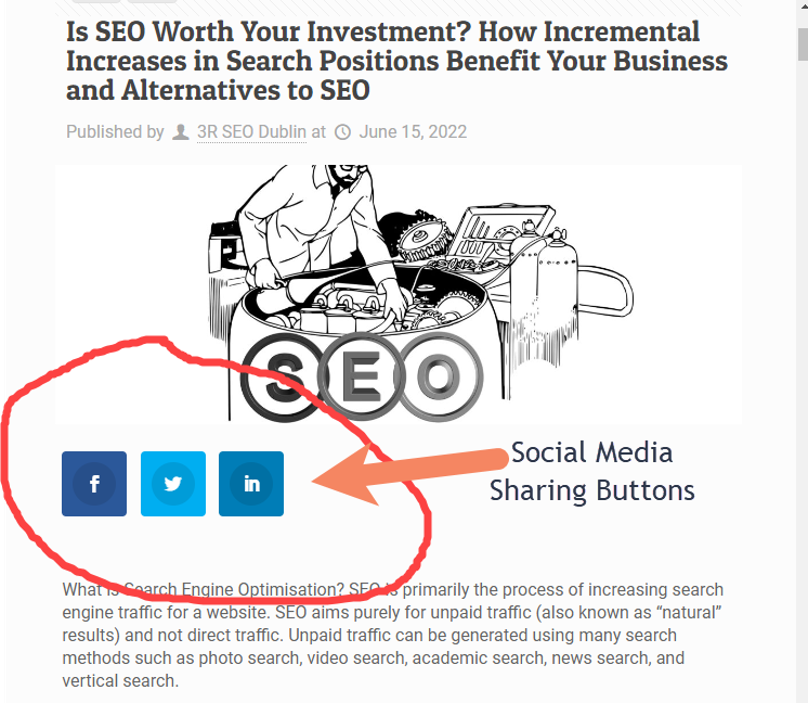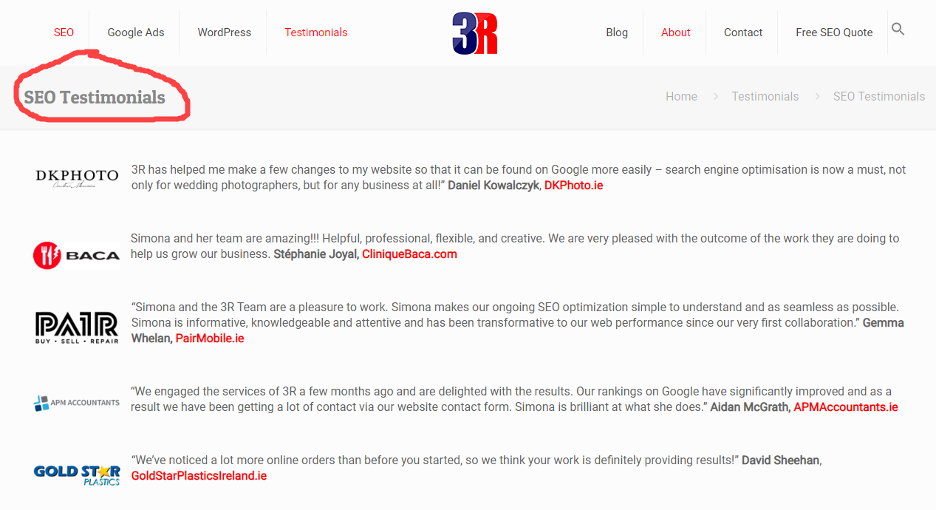
Can Smart Search Engine Optimisation by an SEO Consultant Expert Boost Google Ranking?
August 1, 2022
Should WordPress Design Pricing Packages Include Powerful SEO Landing Pages?
December 15, 2022If you’re looking to boost your website’s visibility and rankings, we’ve listed some tips from an SEO consultant that can help you. But first, let’s talk about how search engines work. You should know this if you want to optimise your website on your own.
Search engines use algorithms to rank websites according to their relevance to a particular search query. So, to improve your website’s ranking, you need to ensure your site is optimised for these algorithms.
You can do several things to optimise your site, including improving your content, working on your backlinks, and using the right keywords. You can also use tools like the Yoast SEO plugin to help you with your search engine optimisation efforts.
It sounds complicated, but by following our tips below and using the right tools, you can make your website rank higher in search engine results pages (SERPs). If the task seems more work than you have time or skill for, get in touch with an SEO professional.
Here’s one of our previous posts on what you should expect from an SEO agency.
Now, here are 11 top tips from an SEO consultant to help you boost your website’s rankings:
1. Improve Your Content to Maximise Rankings
This one should go without saying. But unfortunately, it’s all too common to see websites with poorly written, outdated, or just plain boring content.
If you want people to visit your website and stick around, you need to give them a reason to. The best way to do that is by publishing high-quality, original content relevant to your audience.
Take note:
When it comes to SEO, content is still king. Hence, it would help if you focused on creating great content for your website to rank higher in search results. This means writing articles, blog posts, and other types of content that are informative, well-written, and engaging.
When creating content, include relevant keywords people are likely to search for. This will help your site show up in more search results.
However, don’t stuff your keywords in awkwardly – this will just turn people off. You want to use keyword phrases that make sense to bring organic traffic to your site from people interested in your topic.
A good example is our own headline in this article which uses SEO-related keywords.
Remember:
You need to use specific keywords in your article’s title. When people search for information online, they use keywords to help them find the best results. So, if your article’s title includes the right keywords, it will appear higher on the search results pages.
Want to learn more about writing great content? We wrote extensively about digital marketing and content marketing in this post.
Of course, it’s not enough to simply include keywords in your title. You also need to ensure your content is high quality and relevant to your target audience.
Make sure you then publish high-quality content regularly. This will help keep your site fresh and relevant to users, as well as improve your rankings.
Lastly, ensure that all of your website’s content is original. Duplicate content can hurt your rankings. So, everything on your site must be unique and informative. This way, you boost website rankings naturally and avoid getting penalised by Google.
2. Use the Right Keywords for Search Engines and Your Subject Matter
Make sure your website is optimised for search engines. This means using the right keywords and including them in the right places on your site.
Choosing the right keywords is essential for good SEO. These are the words and phrases people enter into search engines when looking for something.
To find the right keywords, Google AdWords Keyword Planner is a great keyword research tool. This will help you see how often people search for particular keywords and how much competition there is for them.
Once you’ve chosen your keywords, use them throughout your website – in your titles, headings, content, and even in your alt tags.
Do Keyword Research in Relation to Your Competitors
When it comes to SEO, competitor research is one of the most important things you can do. By looking at what your competitors are doing, you can get a good idea of what techniques are working for them and then adapt and improve upon them for your own website.
One way to do competitor research is to carry out keyword research. This involves finding out which keywords your competitors are targeting and then identifying the ones with the highest search volume and the lowest competition.
Once you know which keywords to target, you can start including them in your content and website. You can also use them in your paid advertising campaigns and track how well they perform using tools like Google AdWords Keyword Planner.
3. Work on Your Backlinks – Both External and Internal Links
Use external links to direct traffic back to your website. This can improve your site’s rankings and drive more traffic to your pages.
External links or backlinks are links from other websites to yours. They are essential to SEO because they help improve your website’s authority.
To get backlinks, you can reach out to other website owners and ask if they will link to your site. You can also post links on social media and in forums.
Use keyword-rich anchor text when linking from other websites to yours. This will help boost the ranking of those pages on Google search results pages (SERPs).
It is important to realise that internal links are also crucial. These are links between the pages on your own website. By linking to other pages on your site, you can improve the ranking of those pages.
A good example is the link to our last blog post, “Is SEO Worth Your Investment? How Incremental Increases in Search Positions Benefit Your Business and Alternatives to SEO”.
Regarding on-page SEO, using the correct keywords in your internal links is a great way to help Google and other search engines understand what your pages are all about. This can, in turn, help boost your site’s visibility and ranking in search engine results pages (SERPs).
There are a few things to keep in mind when including keywords in your internal links:
- Try to use the same keyword or phrase in the link’s text as you do on the page you’re linking to.
- Use keywords sparingly so as not to overwhelm or distract you from your pages’ content. A couple of strategic links should be enough.
- Make sure the links are relevant to the content on the target page.
By following these simple tips, you can improve your site’s on-page SEO and increase traffic from search engines.
4. Optimise Your Images in Your Content to Rank Better for SEO
Images are a great way to add visual interest to your website. But did you know that they can also help with your SEO?
It’s a well-known fact that Google loves images. In fact, according to recent studies, image-based searches are growing faster than any other type of search.
So, optimise your images for Google to rank higher in search results. To do this, include keywords in your file names and alt tags when you upload images to your website. This will help Google understand your images and how they relate to the rest of your website. This will also help search engines index your images and improve your website’s ranking.
5. Use Social Media to Engage With Potential Customers for Powerful SEO
Social media is a great way to promote your website and attract visitors. So, use social media to promote your content. This will help it reach a wider audience and drive traffic to your site.
When you post links to your site on social media, be sure to use relevant keywords in the descriptions so they will feature in search results. Don’t forget to add social sharing buttons to your website so people can easily share your content with their followers.
Get involved in online communities and forums related to your industry or niche. This is a great way to build relationships with other webmasters and promote your content to a wider audience.
6. Encourage Click-Throughs
When people see your website listed on a search engine results page (SERP), you want them to click through to your site. This is called click-through rate (CTR). But convincing searchers to click on your link on SERPs can be challenging given the number of competitors you have.
The thing is that it may be challenging, but it is not impossible. If you want people to click through from Google search to your website, there are a few things you can do to persuade them.
First, make sure your website is optimised for Google search. This means using the right keywords in your titles and descriptions as well as making sure your site is easy to navigate. You can also add a sitemap to help Google index your pages correctly.
Create engaging content that will interest people. Make sure your headlines are catchy. Write informative SEO articles to help people solve problems or learn something new. You can also add images and videos to your articles to make them more appealing.
Ensure your website is easy to find. Add a link to your website on your social media profiles and include it in your email signature. You can also submit your site to directories and review sites, as well as include a link in your company’s press releases.
Finally, add social proof by including testimonials and reviews. Putting testimonials and reviews on your website is a great way to boost your reputation and encourage potential customers to buy from you. Customer reviews can also help you identify areas of your business that need improvement.
Just a reminder:
Make sure that you only use customer reviews that are genuine and honest. If you have doubts about a review, it’s best not to include it on your site. You could also ask your customers if they would be happy to leave a review on your site or provide a link to where they can do so.
If you have a lot of customer reviews, it can be helpful to display them in a widget on your homepage or sidebar or even create a separate page on your site specifically for customer reviews.
7. Update Your Website Regularly
Stale websites can quickly lose their rankings, so keep things fresh! Regularly update your website with new content.
Search engines like to see websites that are frequently publishing fresh content. So, one of the best things you can do for your SEO is to add new articles, blog posts, products or other types of content on a regular basis.
A blog is often the best format. It’s easy to use. Plus, it allows you to post regular updates that will help keep your site fresh and engaging for visitors.
When creating a blog to introduce new content to your website, you want to make sure that it’s easy for users and search engines to understand. Here are a few tips on how to format your blog for the best results:
- Start by writing an attention-grabbing headline that accurately reflects the content of your article.
- Write in a clear, concise style. Use short paragraphs and easy-to-read sentences.
- Ensure your article is well-structured, with a clear introduction, body and conclusion.
- Use headings and subheadings to break up your content and help readers scan it quickly.
- Use images, graphs, and charts to illustrate your points, but make sure they are properly optimised for Google.
- Include links to other relevant articles on your site and external sources to help readers learn more about the topic.
- Use Yoast SEO to edit your meta titles and meta descriptions to reflect your article’s content.
Include a link to the article on your website. Make sure all the information is accurate and up-to-date. You can also add social media buttons so that readers can share your content with their friends and followers.
You can see how all 3R’s blog entries are linked to and have links within them by checking out our SEO blog.
8. Use Google Analytics and Webmaster Tools
You can use Google Webmaster Tools to monitor your website’s health and performance. If you notice any problems, address them as soon as possible to avoid any penalties from Google.
Google Analytics is a free tool that allows you to track how people are finding and using your website. By seeing which keywords and phrases people use to find your site, you can adjust your content and marketing strategies accordingly. Google Analytics also lets you see how long people stay on your site and which pages they are most interested in.
Google Search Console is another useful tool. You can use it to create and submit a sitemap. Doing these things gives you a better chance of being included in search results.
In case you didn’t know, a sitemap is an XML file that contains all the URLs for a website. Search engines use it to index websites.
9. Use H1 and H2 Tags on All Pages and Blog Entries
Headings are important on web pages as they help organise and structure the content. There are six levels of headings, with H1 being the most important.
It’s essential to use relevant keywords in your headings, as this will help improve your site’s ranking in search engine results pages (SERPs). Also, try to keep your headings short and to the point.
The H1 heading is usually the title of the page. It is a good idea to include your main keyword in this heading. The H2 and H3 headings can also include keywords, but you shouldn’t go overboard with keyword stuffing. A good rule of thumb is to use no more than two or three keywords in any given heading.
10. Implement Responsive Design in Your Website
Responsive design is a type of web design that allows websites to be viewed on devices of all sizes, from mobile phones to desktop computers.
Mobile optimization is important for two main reasons:
- More and more people are using smartphones and tablets to access the Internet.
- Google now penalizes websites that are not mobile-friendly.
Since more and more people are using mobile devices to access the Internet, it’s essential to make sure your website is optimized for these users. Responsive design will help ensure that your website can be viewed and used on all devices.
11. Improve Your Page Loading Speed
One of the ranking factors that Google uses is page loading speed. If your website takes too long to load, it could negatively affect your SEO.
Approximately 40% of visitors abandon websites in less than 3 seconds of loading. 80% of those visitors will not come back. It can ruin a site’s ranking and ultimately cause a loss of visitors.
So, if you want your website to rank well in search engines, it’s a must to focus on page loading speed. By making some simple tweaks, you can significantly improve your site’s performance.
There are several ways to improve your page loading speed, including:
- minimizing the size of your images
- optimizing your code
- using a content delivery network
12. Stay Up-to-Date With the Latest Changes in Google’s Algorithm
Google is constantly changing its algorithm in an effort to provide the best possible search results for its users.
One of the noteworthy changes they have made is penalized websites that had too many ads above the fold. This was an attempt to ensure that users would see more relevant content when they conducted a query.
Another important algorithm change was giving preference to mobile-friendly websites. This was in response to the increasing number of people using their mobile devices to access the Internet.
These are just a few examples of the many changes Google has made to its algorithm. So, if you want to stay ahead of the competition, it’s vital that you keep up with these changes and make sure your website is optimized for them to stay ahead of the competition.
In conclusion, to rank higher on SERPs, you need to make sure your site is optimised for the algorithms that search engines use. This can be done by improving your content, working on your backlinks, and using the right keywords, to name but a few.
There is no doubt that making your website rank high on SERPs is not going to be a walk in the park. But the tips above can go a long way in helping you improve your position on search results.
Want help with your SEO? Call us today on +353 (0) 89 466 2000 or +353 (0) 1 960 9023 for a free website audit. Our team of experts will be able to tell you what you need to do to boost your rankings and get more traffic to your site.









